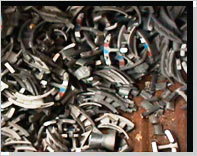 Titanium Scrap (Ti) Titanium and its alloys have found a wide range of applications, including aerospace, biomedical and chemical industries because of the combination of high mechanical and corrosion resistance and low density. At the same time, quality of by-products, such as Ti chip obtained in machining method has also been increasing at a fast rate, but technologies for the recycling of these products is limited because of the activity at high temperature and cost of process.
Titanium Scrap (Ti) Titanium and its alloys have found a wide range of applications, including aerospace, biomedical and chemical industries because of the combination of high mechanical and corrosion resistance and low density. At the same time, quality of by-products, such as Ti chip obtained in machining method has also been increasing at a fast rate, but technologies for the recycling of these products is limited because of the activity at high temperature and cost of process.
One of the useful method for recycling of Ti by-products is hydrogenation. Metal hydrides have a variety of important commercial applications, such as purification of hydrogen, hydrogen embrittlement in powder metallurgy, control materials in nuclear reactors, electrodes for batteries and hydrogen storage materials. Some conventional methods for hydrogenation of Ti are -
- Exposure to H2 gas at an elevated pressure and / or temperature for several hours.
- Slow cooling so as to maintain maximum hydrogen content.
Titanium Scrap & Titanium Alloy Scrap
Titanium scrap (Ti Scrap) and titanium alloy scrap (Ti Alloy Scrap) have a variety of properties when it comes to useful characteristics. With the vast amount of titanium used, there is also a vast amount of titanium scrap and titanium alloy scrap to recycle from these different forms. Titanium scrap and titanium alloy scrap has proved to be highly useful with their properties of superior corrosion resistance (saltwater propeller shafts), hard but lightweight makeup and high melting temperature.
Types / Grades
Different types / grades of titanium scrap that are recycled to recover pure titanium are given in the table below -
| Grade | Details |
| Mixed Titanium Solids | It consists of clean sorted titanium solid scrap. |
| Titanium Turnings | In includes clean sorted titanium grindings or turnings. |
| Titanium Sworf | It comprises of assorted sworf and titanium residues. |
| RUTILE Scraps | This grade of titanium scrap consists of iron oxide materials. |
| Titanium Sponge / Residues | It consists of assorted titanium in a sponge form. |
| Other Titanium Scrap | This grade consists of all other titanium scraps that are not given in this list. |
Extraction of Titanium
Though the present extraction of titanium through the Kroll process is relatively energy intensive as compared to other engineering metals, the savings in terms of energy and waste savings that are achieved by the use of titanium represent a payback, which is not available from less corrosion resistant, heavier, less strong and less environment friendly materials. Development and growth in the use of reduced energy extraction processes continues, especially with the FFC electrolytic de-oxidation process that is not only an environment friendly process, but also consumes less energy.
Production of Titanium
Hot working of titanium metal from billets or ingot follows similar processes to other metals, but usually at a lower temperature than for example steel or nickel based alloys. Energy consumption per weight of processed material is overall of the same order as for steel, however due to its low density, the volume of titanium product yielded is usually 30-40 % higher.
Reclamation and Recycling of Titanium
Titanium scrap generated in manufacturing processes and in equipment fabrication is completely recyclable. Titanium producers have made significant investments in cold hearth and other remelting furnaces, which has vastly improved the economy of recycling and made possible the direct use of a comprehensive range of scrap forms. The sustained value of life expired titanium systems and parts should always be taken into account while considering life cycle cost. The probability that titanium processing plant and equipment will remain both clean and corrosion free, means that the re-use of whole plant or of elements of the plant, e.g. condenser tubing, can be considered, and provide further economies in important equipment production and procurement cycles.
Electrochemical Processes
The use of titanium anodes vastly increases the environmental friendliness of electrochemical processes, such as production of chlorine. Titanium anodes are more stable than zinc, lead, nickel or mercury. Titanium electrode activating coatings can be replaced various times on the same titanium structure. The process control (safety and consistency) and process efficiency (energy input per unit of product) are considerably higher when titanium electrodes are used.
Titanium & the Environment
Titanium is one of the most environment friendly metals, which has outstanding resistance to corrosion in a wide range of aggressive conditions. This eliminates or significantly reduces -
- Land, water or air pollution from corrosion failure of process plant
- Metal loss and energy input for replacement / repair.
- Pollution of rainwater from cladding or run-off of roofs in architectural application.
- Product contamination from the loss of metal or by cross stream leakage caused by corrosion.
The low weight of titanium reduces:
- Fuel consumption in ships, aircraft, and land vehicles
- Energy loss in reciprocating equipment
- Performance shortfalls in payload, speed, range and other critical factors
The total bio-compatibility of titanium assures:
- Safe use in tissue replacement and human bone
- Harmlessness to terrestrial and marine flora and fauna
- Non-interference with microbiological processes and immunity to them
The ability to recycle titanium ensures:
- Optimum recovery of every form of reverted material and scrap
- Overall decrease of energy input to sustain metal supply
